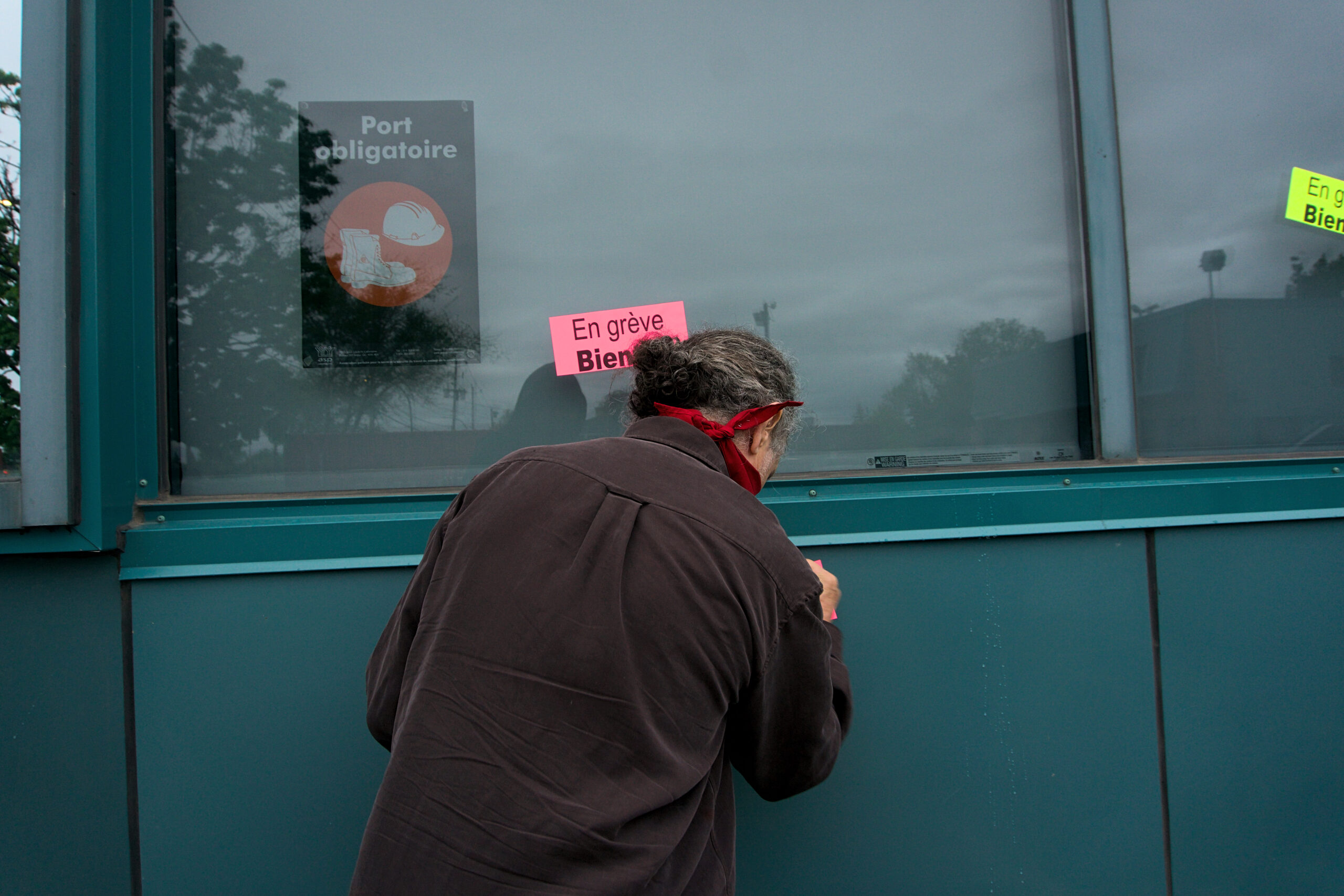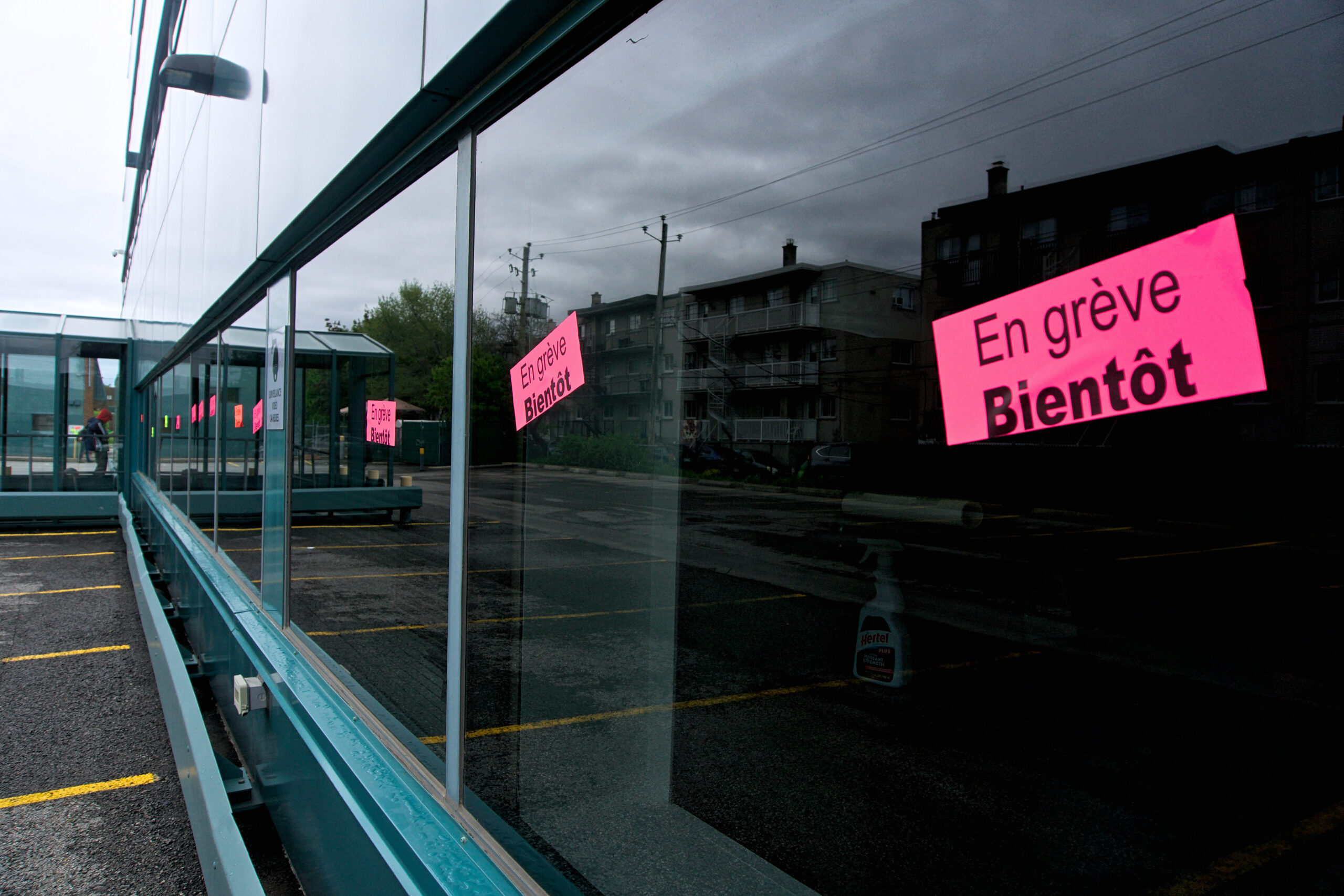On the brink of a possible strike in Quebec’s residential construction sector, negotiations between the union alliance and the sector’s employer association remain stalled. Tensions are rising, as residential construction is now the only sector without a deal, while the other four have secured significant wage increases. A strike could be called as early as May 22.
To get a clearer view of the situation on the ground, The North Star followed rank-and-file construction workers as they took direct action early Monday morning. They plastered the headquarters of the Association des professionnels de la construction et de l’habitation du Québec (APCHQ) with stickers, denouncing the employers’ association for refusing to negotiate a deal similar to the agreements already signed in every other sector of Quebec’s construction industry.
The APCHQ represents over 28,000 residential construction companies in Quebec and negotiates collective agreements on their behalf. It is the only employers’ association in the industry that has yet to reach a deal with the Alliance Syndicale, a coalition of Quebec’s five construction unions representing more than 221,000 workers across the province.
“‘There’s still the APCHQ, which refuses to make concessions. They’re on a 16% pay rise, which is well below what we’ve achieved in other sectors.'” says Richard (alias for anonymity) a carpenter who has worked in the industry since 2008 and participated in the action on Monday.

In the other four sectors—commercial, industrial, institutional, and civil engineering & roadworks—agreements were ratified by workers on April 10th. These deals included significant wage boosts, totaling a 22% increase over four years, starting with an immediate 8% raise in the first year when the previous contract expired on April 30th.
“It creates a big imbalance between sectors, which makes it very unattractive for workers to go and work in the residential sector, whereas in a country where we have an unprecedented housing crisis, we have to succeed in providing good jobs so that people want to go and work in that sector,” says Richard.
The stickering took place amid a negotiation blitz announced by the Alliance on May 16th, aiming to reach a deal with the APCHQ by 9 a.m. on May 21st. While the action wasn’t led or approved by the Alliance, Richard says the rank-and-file workers behind it took the initiative, hoping to boost the Alliance’s leverage at the bargaining table.
“Over the past week, the Alliance has issued orders to line building sites and distribute helmet stickers for workers in the residential sector.”
He continues: “So a pressure tactic like that, stickers, gets our message across. Then, we hope it can move the tables.”
Some of the stickers plastered across the front doors of the APCHQ headquarters read “Travail égal, paye égal” or “Same work, same pay” in English, a slogan propagated by the Alliance referring to the sectoral pay differences between residential and the other four sectors.
The sector differences go back to 1993, when Robert Bourassa’s Liberal government deregulated residential construction and cut wages amid an economic crisis. Though the sector was re-regulated in 1994, residential wages have stayed behind other sectors. Accepting a 16% raise now would only widen that gap.

The other stickers put up on the APCHQ’s building read “En Grève Bientôt” or “On Strike Soon”, which hints at a possible course of this labour conflict. On the May 21st deadline given to the APCHQ, the coalition will be able to call a strike in the sector as all of the five unions have received strike mandates from their members.
Even if the majority of members voted in favor of a strike, strikes in the residential sector have long been difficult to implement. With 28,000 companies, 81 percent having 10 or fewer workers, it is hard for unions to monitor and hold picket lines. Still, Richard believes all pressure tactics, including a strike, should be used to settle the labor dispute.
“We have to keep up the pressure in the hope that there will be a settlement. And even if there isn’t a settlement, well, that’s training us to fight, it’s training us to use our leverage, then our balance of power. And that, well, that’s a muscle that we have to keep practising in labour struggles.”
Another difficulty in maintaing mobilization and organization of a strike in the sector, will be that workers from other sectors won’t be able to maintain picket picket lines considering their agreements are already ratified and they have to work.
“So it’s much more difficult to go out in support and strike to increase our strength… Well, we have to use other means…” Richard says as he begins to list off some creative ideas to get around the situation.
“Can someone get sick and then go and support the effort to enforce the strike mandates? Do we slow down the work? Do we organise events on evenings and weekends? These are all options in our repertoire for putting pressure on employers. That’s why today, on a public holiday, we have the opportunity to strike a blow like this.”

Within the context of various attacks on the working conditions of constructions workers and the power of unions in the form of Bill 51 and the modernisation of the law R-20, Richard sees a broader fight at play in these negotiations.
“It’s the pendulum swinging back after we’ve made gains that the employers found unacceptable. While staying aware that it’s us who create all the wealth that ends up in the pockets of the bosses and the companies, we need to take back control over the work we do. Already, having democratic unions where we’re able to speak out may be a sign of a society that could become more democratic too, where people are able to have control over what they produce.”

